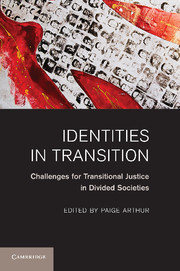Introduction: Identities in Transition
Published online by Cambridge University Press: 01 March 2011
Summary
In times of transition, divided societies face difficult practical questions about how to devise new state and civil-society institutions that will diminish the potential for discrimination, conflicts over political power, and intercommunal violence.
It is unclear, however, what special approach – if any – transitional justice measures should take in these kinds of contexts. Transitional justice is a response to massive or systematic violations of human rights that aims to recognize victims and to prevent the recurrence of abuse. It is often associated with a set of measures that, taken together, work toward those two aims in ways that reinforce one another. Those measures include prosecutions, especially for those most responsible for grave human rights violations; truth telling that publicly recognizes the abuse, often in the form of an official commission; massive reparations programs that provide a mix of material and symbolic benefits to victims, including official apologies; memorialization projects that educate the public and also provide a space for mourning; and reform of abusive institutions, most often security forces such as the police and military.
Transitional justice has emerged over the last two decades, building on experiences mainly in Latin America, Eastern Europe, and Africa to develop new norms at the international level, based on rights to truth, justice, reparation, and nonrepetition. Given the contexts out of which it first emerged – new democracies in the wake of dictatorships in Latin America – transitional justice has primarily been concerned with “first generation” human rights, that is, civil and political human rights violations.
- Type
- Chapter
- Information
- Identities in TransitionChallenges for Transitional Justice in Divided Societies, pp. 1 - 14Publisher: Cambridge University PressPrint publication year: 2010
- 7
- Cited by

